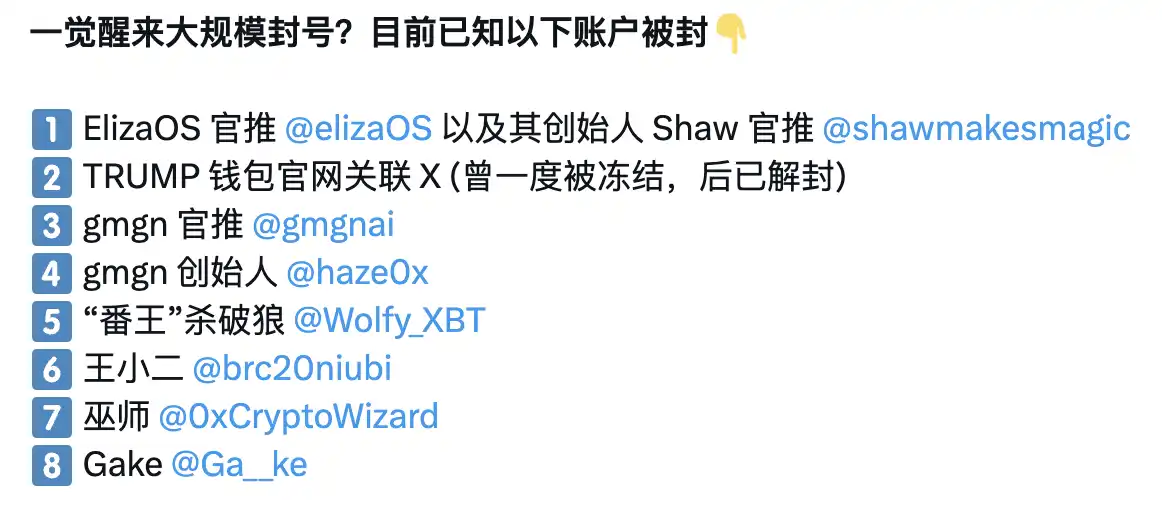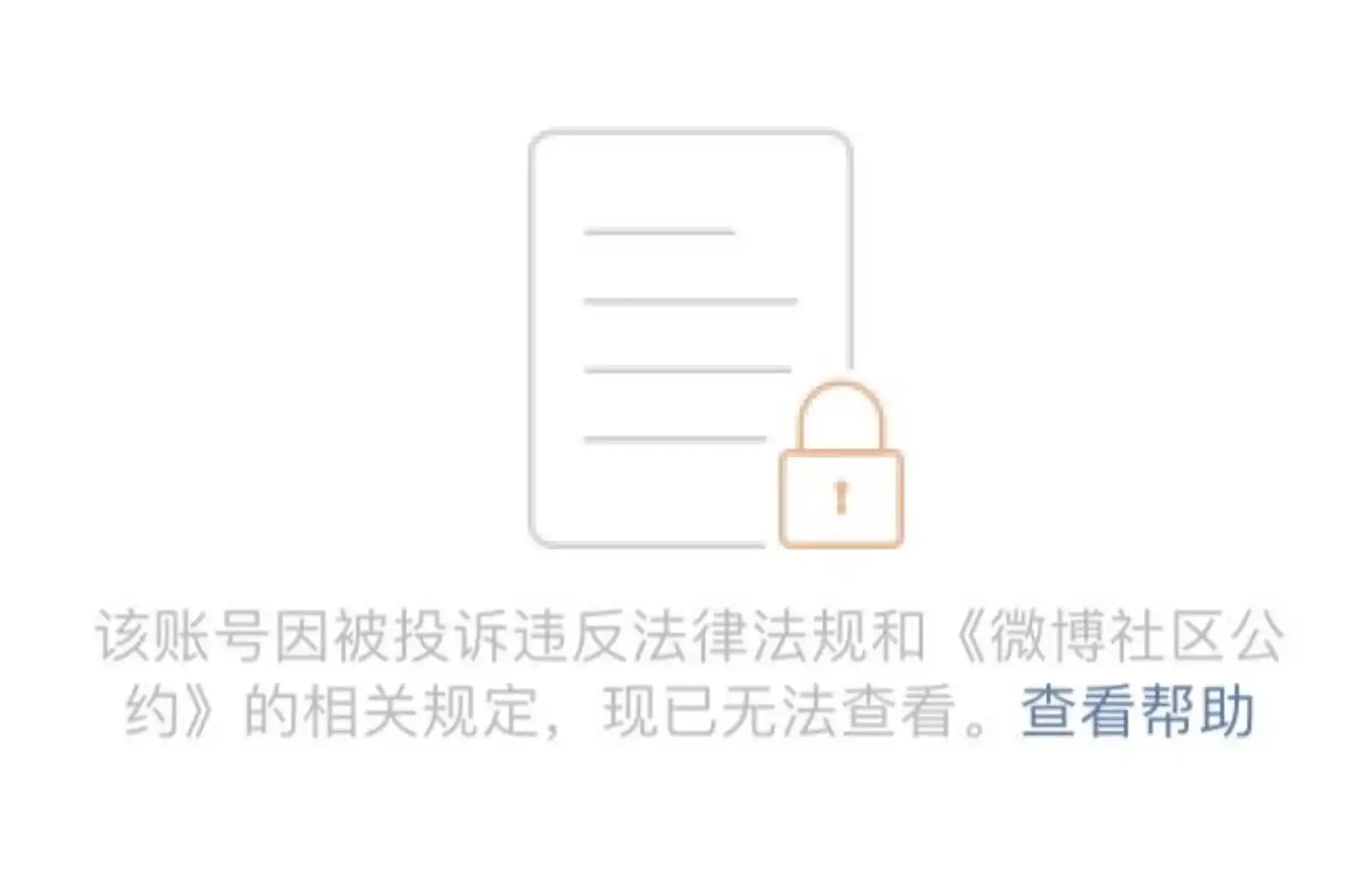The collective account bans in the cryptocurrency community, which haven't been seen for many years, have reappeared, not on Weibo, but on Elon Musk's free speech platform, X.
Currently banned accounts in the cryptocurrency space include the official gmgn account and its founder, the official eliza account and its founder, as well as several well-known crypto KOLs.

Possible Reasons for the Bans
First, looking at history, there have been many instances of individual accounts being banned on X, such as Trump or the well-known figure in the crypto space, CSW (Craig Wright). However, mass account bans are quite rare.
There was one such instance in 2021 during the Capitol Hill incident, where tens of thousands of accounts supporting Trump were banned. After Musk took over X at the end of 2022, he cleaned up a large number of fake or impersonating accounts, as well as many bot accounts, primarily targeting those that were beneficial to himself and aligned with his political direction.
Thus, one theory regarding this mass banning is related to a political meme, as shown in the image below. This meme clearly plays on the potential reconciliation between Trump and Musk, as both have made friendly remarks towards each other. Some believe that Musk dislikes this meme and has banned the related accounts.

However, this reasoning is evidently flawed. Firstly, it is not just these few accounts that posted this meme; some of the banned accounts didn't even post related memes, and many other accounts that posted images on X were not banned.
Another viewpoint suggests that the bans are primarily related to GMGN, as GMGN has been using crawlers to scrape a large number of tweets on X intensively. But this reasoning also has issues, as there are many InfoFi projects now, and not all of them are using X's API honestly; most are also using crawlers, yet those project accounts have not been banned.
Rhythm BlockBeats also asked the banned account Haze, who stated that they currently do not know the specific reason and are waiting for a response from X.
Coincidentally, Musk tweeted on June 10 that X's algorithm has been adjusted again, with a large use of Grok. Therefore, we also inquired about Grok regarding this banning incident.
Grok listed some possible reasons:
User Reports: There are posts claiming that a certain user used quantitative bots to report Chinese cryptocurrency accounts in bulk, accusing them of "buying low and dumping high" or ambushing with small wallets while cutting profits with large wallets. This could lead to the algorithm mistakenly identifying it as "platform manipulation" or "spam."
Content Patterns: Banned accounts frequently mentioned specific crypto projects (like ai16z, ElizaOS) or interacted with GMGN, which could be recognized by the algorithm as "inducement promotion" or "potential fraud." X is sensitive to cryptocurrency content due to its frequent involvement in high-risk investments or scams.
Algorithm Misjudgment: Grok's enhanced automated detection may be overly sensitive to accounts with high-frequency posting or similar patterns (like meme coin promotion), leading to wrongful bans. Historical cases show that cryptocurrency accounts have been temporarily banned for being mistakenly labeled as spam.
Will it follow in Weibo's footsteps?
The recent bans on cryptocurrency user accounts on Twitter easily evoke memories of the large-scale bans on cryptocurrency KOL users on Weibo in 2018 and 2021, such as accounts from Jinse Finance, Huobi News, Coin World, and personal accounts like @SuperBitcoin, @TraderXiaoxia, @LanShaoCX, @LiFashiTony, @BitcoinCaesar, @FatHouseBitcoin, etc. The relevant pages indicate that these accounts were all banned due to complaints of violating laws and regulations and the Weibo Community Convention, and are no longer viewable.

After the banning incident, crypto KOLs on Weibo could only shift their battleground to Twitter. Under an extremely opaque censorship system, a large number of content creators were "uprooted," and Weibo gradually withdrew from the center of the cryptocurrency industry's public opinion.
In this context, Twitter has since become an important stronghold for the Chinese crypto community. Compared to Weibo's closed censorship system, Twitter, with its openness and brand narrative of free expression, has provided a safe haven for many crypto KOLs and project parties. However, this safe haven now seems to be losing its protective power, as the AI-driven content governance system (like Grok) is being deeply deployed, making X's banning actions more systematic, automated, and harder to hold accountable.
In contrast, the X platform is not a government-led content censorship but is gradually sliding into a new centralized information control model under the logic of depersonalization and algorithmic governance. In this mechanism, even if the platform does not directly intervene in content judgment, it may exacerbate misjudgments, amplify public opinion attacks, and abandon manual reviews through technical means, thus creating a more opaque environment for expression.
Related Reading: "The World Dislikes Today's Social Media"
In the face of this increasingly reinforced logic of technical blockade, the value of decentralized social networks is being reassessed. On-chain social protocols like Farcaster and Lens Protocol are being frequently mentioned. However, these protocols are still in their early stages, and their user experience and mainstream influence are far from X, making it difficult to form a substitute in a short time.
Nevertheless, as content creators find it hard to escape the content platform trap and face a severe regulatory environment, it seems to be a foreseeable trend for them to move to decentralized social platforms and have more freedom in account ownership.
Finally, to protect X accounts for cryptocurrency content creators, the following measures can be taken to reduce risks:
Avoid High-Frequency Promotion: Reduce frequent mentions of specific projects or contract addresses (CA) to avoid being misjudged as inducement content.
Compliant Posting: Ensure that content does not involve exaggerated returns or misleading statements, and comply with X's advertising and financial product policies.
Security Measures: Enable two-factor authentication (2FA), regularly check account permissions, and prevent being hacked, which could lead to bans.
Appeals and Communication: If banned, promptly submit an appeal through X's appeal channels and publicly seek community support.
BlockBeats will continue to monitor this situation and provide reliable news to readers in a timely manner.
免责声明:本文章仅代表作者个人观点,不代表本平台的立场和观点。本文章仅供信息分享,不构成对任何人的任何投资建议。用户与作者之间的任何争议,与本平台无关。如网页中刊载的文章或图片涉及侵权,请提供相关的权利证明和身份证明发送邮件到support@aicoin.com,本平台相关工作人员将会进行核查。




